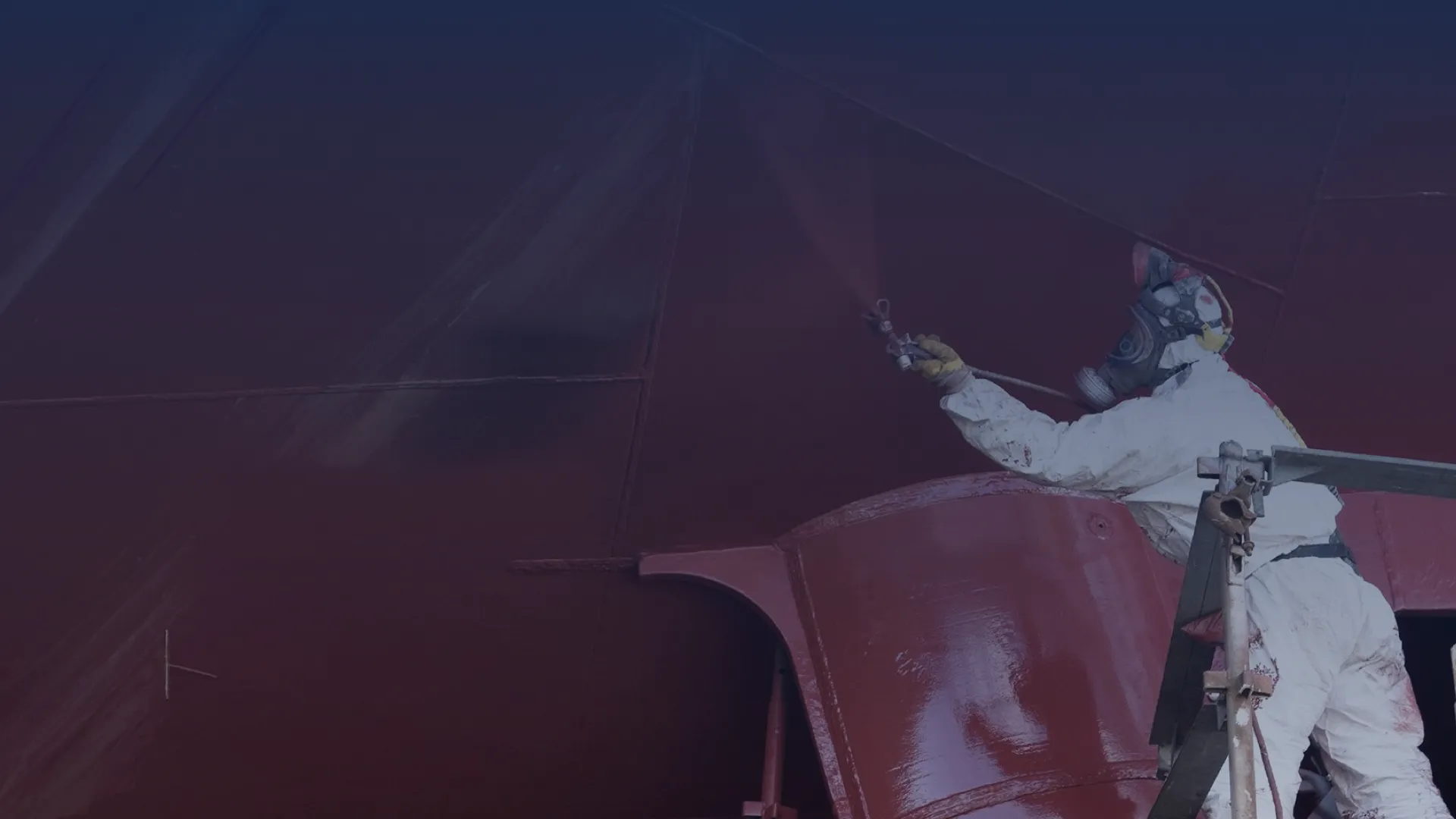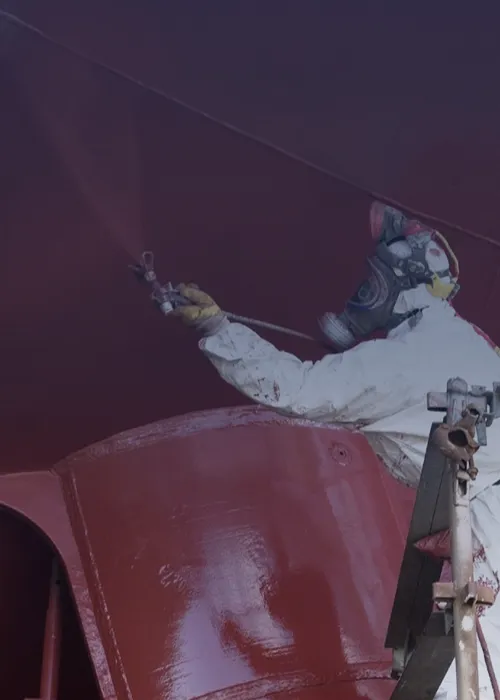
Biocide-Free Antifouling
Antifouling plays a crucial role in the maritime sector. This protective coating is specifically designed to effectively prevent biofouling, the harmful accumulation of aquatic organisms on ship hulls. Biofouling occurs when algae, barnacles, tube worms, and mussels attach themselves to the hull, increasing the ship’s hydrodynamic resistance. This leads to higher fuel consumption, reduced efficiency, and increased maintenance costs. Traditional antifouling products often contain biocides, chemical substances that kill harmful organisms but may also negatively affect the aquatic ecosystem. Biocide-free antifouling offers an environmentally friendly and sustainable alternative. It prevents biofouling by creating a smooth surface on which organisms find it difficult to adhere. In collaboration with our selected partner, we offer biocide-free antifouling. This innovative, durable coating reduces hull friction, protects vulnerable marine environments, and eliminates the need for environmentally harmful biocides.

Properties
The biocide-free antifouling forms a hard, protective layer that is water-resistant, durable, chemically stable (inert), and non-toxic. This coating is applied in two layers below the waterline, with each layer carefully applied to the correct thickness for optimal protection against wear and corrosion. A well-prepared substrate, such as steel, aluminum, or glass fiber-reinforced plastic (GRP), is crucial for strong adhesion. This eco-friendly coating is suitable for both newbuild vessels and existing ships and can be easily applied during routine maintenance in dry dock.
This biocide-free coating is known for its strong adhesion and wear resistance, especially against ice. Moreover, this coating remains flexible, ensuring lasting adhesion even when hull plates deform under severe sea conditions.
Performance
Regular underwater cleaning is essential to maintain the performance of the biocide-free coating. This prevents the buildup of biological growth, which would otherwise increase water resistance and raise fuel consumption. Cleaning is carried out with specially designed equipment that effectively removes growth without damaging the hard protective layer.
Even stubborn organisms such as shellfish can be removed without damaging the protective layer or harming the marine environment. The cleaning frequency depends on the use of the ship and the environment; ships in warmer waters, for example, require more frequent cleaning. Although this cleaning incurs costs, these are more than compensated for by the fuel savings that a clean hull delivers.
Lifespan
This eco-friendly ship coating is designed to last the full lifespan of the ship, without the need for replacement or major repairs. In the event of damage from collisions, anchor chain wear, or welding work, the antifouling can be easily restored during routine maintenance in dry dock. The uniform layer structure allows for seamless repairs without loss of protection. As a result, full recoating is not necessary, which significantly shortens dry dock time and drastically reduces the vessel’s downtime.
Applications
The biocide-free antifouling is ideal for demanding applications where conventional, often biocide-rich hull coatings fall short:
- Outstanding performance in challenging environments:
- Provides reliable protection against high temperatures at scrubber outlets.
- Resists the harmful effects of aggressive chemicals.
- Suitable for intensive use:
- Ensures optimal protection of decks on RoRo vessels with heavy vehicle traffic.
- Offers durable corrosion protection in ballast tanks.
- Applicable to maritime structures:
- Delivers excellent performance on oil platforms and other offshore installations.
- Designed to withstand harsh maritime conditions.
Regulations
The use of biocide-rich antifouling coatings is strictly regulated to protect the marine environment. The International Maritime Organization (IMO) sets the global standard. With the International Convention on the Control of Harmful Anti-Fouling Systems on Ships (AFS Convention), which has been in force since 2008, the IMO prohibits the use of harmful biocides such as tributyltin (TBT) in antifouling systems due to the significant environmental damage these substances cause.
However, the regulations are not limited to the IMO. Many countries and regional organizations have implemented additional rules. In the European Union (EU), for example, biocides are subject to the stringent requirements of the Biocidal Products Regulation (BPR, Regulation (EU) No 528/2012). This regulation determines which biocides are allowed in antifouling coatings and under what conditions they may be used.
The biocide-free antifouling is specifically developed in response to these strict regulations. This ecological ship coating fully complies with both international and national standards, ensuring that shipowners and operators meet all regulatory requirements. At the same time, this type of antifouling contributes to the sustainable protection of the marine environment without compromising effectiveness.
Biocide-Free Antifouling
In collaboration with our selected partner, we offer biocide-free antifouling. This innovative, durable coating reduces hull friction, protects vulnerable marine environments, and eliminates the need for environmentally harmful biocides.

Properties
The biocide-free antifouling forms a hard, protective layer that is water-resistant, durable, chemically stable (inert), and non-toxic.
This coating is applied in two layers below the waterline, with each layer carefully applied to the correct thickness for optimal protection against wear and corrosion.
A well-prepared substrate, such as steel, aluminum, or glass fiber-reinforced plastic (GRP), is crucial for strong adhesion.
This eco-friendly coating is suitable for both newbuild vessels and existing ships and can be easily applied during routine maintenance in dry dock.
This biocide-free coating is known for its strong adhesion and wear resistance, especially against ice. Moreover, this coating remains flexible, ensuring lasting adhesion even when hull plates deform under severe sea conditions.
Performance
Regular underwater cleaning is essential to maintain the performance of the biocide-free coating. This prevents the buildup of biological growth, which would otherwise increase water resistance and raise fuel consumption.
Cleaning is carried out with specially designed equipment that effectively removes growth without damaging the hard protective layer.
Even stubborn organisms such as shellfish can be removed without damaging the protective layer or harming the marine environment.
The cleaning frequency depends on the use of the ship and the environment; ships in warmer waters, for example, require more frequent cleaning.
Although this cleaning incurs costs, these are more than compensated for by the fuel savings that a clean hull delivers.
Lifespan
This eco-friendly ship coating is designed to last the full lifespan of the ship, without the need for replacement or major repairs.
In the event of damage from collisions, anchor chain wear, or welding work, the antifouling can be easily restored during routine maintenance in dry dock.
The uniform layer structure allows for seamless repairs without loss of protection.
As a result, full recoating is not necessary, which significantly shortens dry dock time and drastically reduces the vessel’s downtime.
Applications
The biocide-free antifouling is ideal for demanding applications where conventional, often biocide-rich hull coatings fall short:
- Outstanding performance in challenging environments:
- Provides reliable protection against high temperatures at scrubber outlets.
- Resists the harmful effects of aggressive chemicals.
- Suitable for intensive use:
- Ensures optimal protection of decks on RoRo vessels with heavy vehicle traffic.
- Offers durable corrosion protection in ballast tanks.
- Applicable to maritime structures:
- Delivers excellent performance on oil platforms and other offshore installations.
- Designed to withstand harsh maritime conditions.
Regulations
The use of biocide-rich antifouling coatings is strictly regulated to protect the marine environment. The International Maritime Organization (IMO) sets the global standard. With the International Convention on the Control of Harmful Anti-Fouling Systems on Ships (AFS Convention), which has been in force since 2008, the IMO prohibits the use of harmful biocides such as tributyltin (TBT) in antifouling systems due to the significant environmental damage these substances cause.
However, the regulations are not limited to the IMO. Many countries and regional organizations have implemented additional rules. In the European Union (EU), for example, biocides are subject to the stringent requirements of the Biocidal Products Regulation (BPR, Regulation (EU) No 528/2012). This regulation determines which biocides are allowed in antifouling coatings and under what conditions they may be used.
The biocide-free antifouling is specifically developed in response to these strict regulations. This ecological ship coating fully complies with both international and national standards, ensuring that shipowners and operators meet all regulatory requirements. At the same time, this type of antifouling contributes to the sustainable protection of the marine environment without compromising effectiveness.
Frequently Asked Questions
To assist you in selecting the most suitable solution for your ship, we have compiled and answered some key questions about biocide-free antifouling.
For what types of ships is biocide-free antifouling suitable?
Biocide-free antifouling is suitable for a wide range of vessel types, including tankers, container ships, bulk carriers, cruise ships, ferries, tugboats, offshore supply vessels, research ships, and dredgers.
Can biocide-free antifouling coatings be applied to other parts of the ship besides the underwater hull?
What is the role of biocide-free antifouling in an air lubrication system?
An air lubrication system can significantly improve the efficiency of your ship by generating air bubbles under the hull, which reduces water resistance.
To fully benefit from this system, a smooth, biofouling-free hull is essential. Biocide-free antifouling ensures this necessary smoothness and sustainably prevents the formation of growth (biofouling). This increases the effectiveness of air lubrication, reduces the ecological footprint, and can save up to 15% in fuel costs.
What other techniques can I apply besides antifouling to improve my ship's efficiency?
In addition to using antifouling, such as biocide-free antifouling coatings, there are various other techniques in the maritime industry that can increase your ship’s efficiency, reduce operational costs, improve sustainability, and mitigate the environmental impact of your operations. Some examples include:
- Energy Saving Devices: These technologies, such as the Pre-Duct, Pre-Swirl Stator (PSS), Propeller Boss Cap Fin (PBCF), Twisted Rudder, and Rudder Bulb, improve the flow of water around a ship. This is done through Computational Fluid Dynamics (CFD), a technique that uses computer simulations to optimize the movement of water around the vessel. These energy-saving additions reduce fuel consumption and lower harmful emissions.
- Waste heat recovery: By reusing the heat released from combustion engines, waste heat can be effectively utilized. This process, which operates according to the Organic Rankine Cycle (ORC) principle, converts the waste heat into electricity, significantly increasing the ship’s energy efficiency and lowering fuel costs.
- Wind-assisted propulsion: Aerodynamically optimized sails, such as suction sails, can harness wind energy to propel the ship. This additional propulsion can result in significant fuel savings, especially over long distances.
